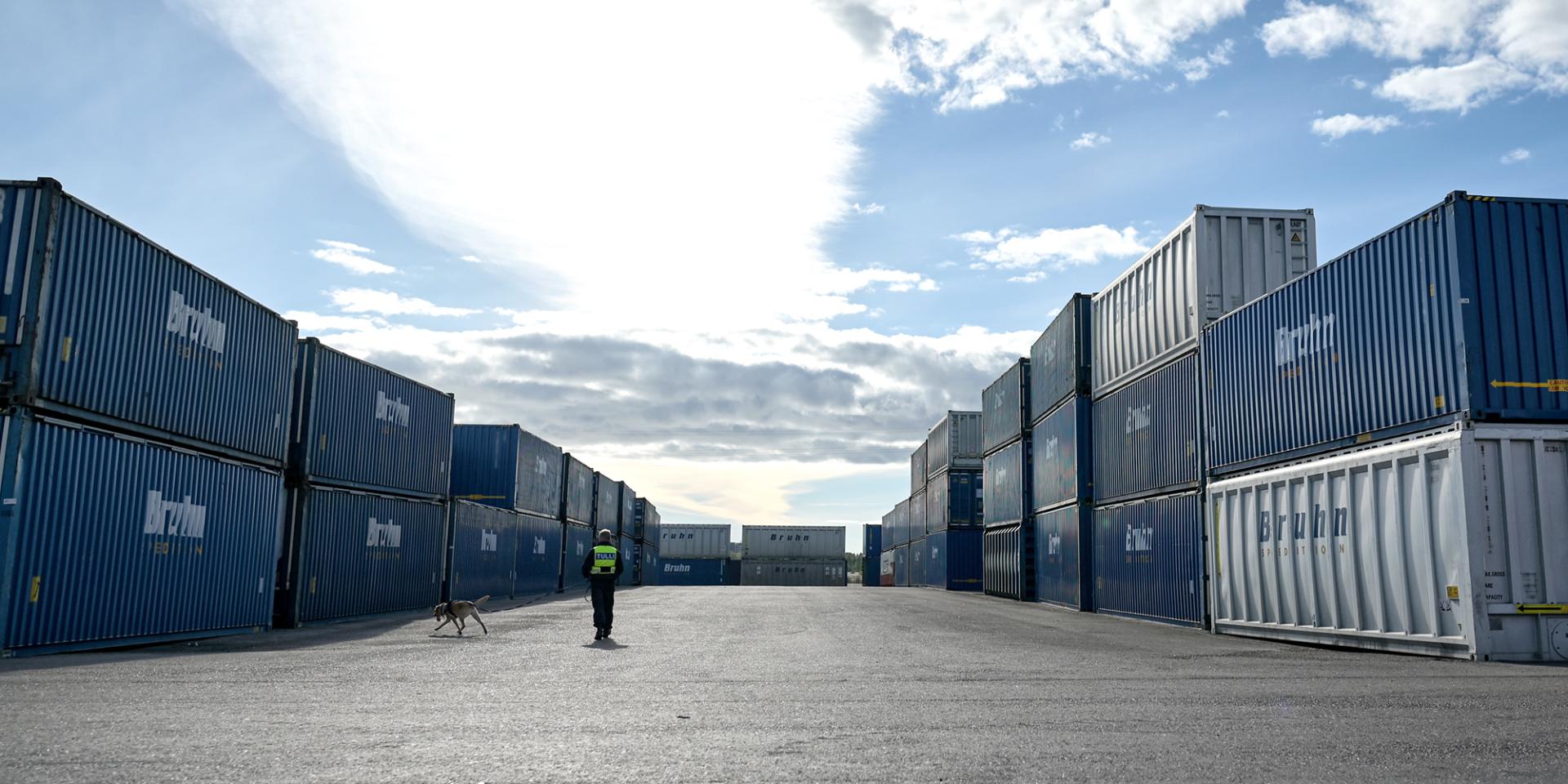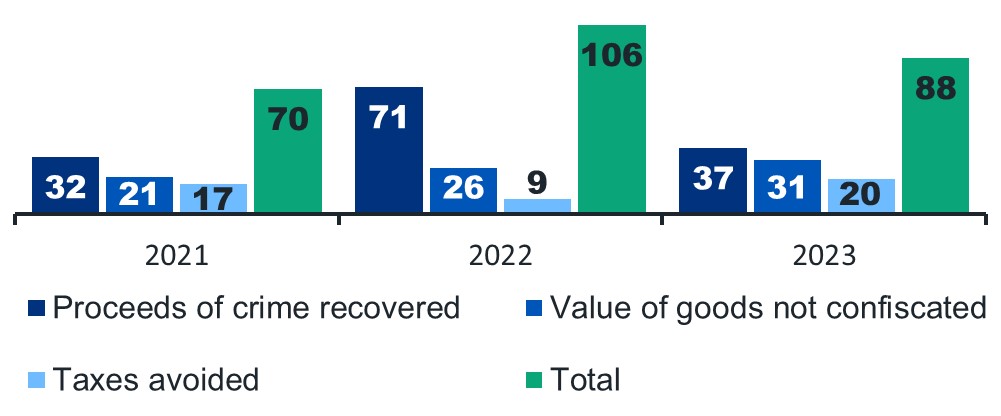We target our controls and crime prevention in response to continuous changes in the operating environment. We ensure the overall security of society in our area of responsibility. By stopping restricted or prohibited substances from entering the country, we prevent the adverse social and economic effects they would cause. We also promote health, environmental protection, human rights and fair competition for companies. In addition, the safeguarding of undisrupted foreign trade helps maintain national security.
We work closely with other law enforcement agencies to combat cross-border crime. Our work makes crime less lucrative, limiting the potential for organised criminals to operate successfully and promoting fair competition among lawful business operators.
Sanctions enforcement ensures that the European Union’s joint foreign and security policies are effective in national and international cooperation and in promoting peace. This has required Finnish Customs to have extensive expertise in risk-based identification, the classification of goods and intervention in cases of non-conformance. By monitoring counterfeit products, we protect consumers, safeguard the State’s tax revenue and the financial interests of right-holders, and combat forced and child labour, money laundering and other criminal financing.
Our efforts
The Government decided to close part of Finland’s eastern border on 18 November 2023 and the entire border on 30 November 2023 due to Russia’s efforts to instrumentalise immigration into Finland in an attempt to destabilise society and impact the security of Finland and the EU.
The temporary closure of the border crossing stations freed up Finnish Customs personnel for other tasks. In addition to handling its own duties, Finnish Customs primarily sought to respond to requests for executive assistance from the Finnish Border Guard. Finnish Customs is a border control authority. Therefore, Finnish Customs personnel could be assigned to border control duties at airports in the north of Finland, among other tasks. This allowed the Finnish Border Guard to effectively allocate its resources to other priority areas, which means that the activities of Finnish Customs led to an effective increase in national security.
Read more
Russia’s invasion of Ukraine and the resulting sanctions against Russia continued to keep Finnish Customs very busy in 2023. The EU has gradually expanded and tightened its sanctions against Russia, with the 12th package of sanctions taking effect in December 2023.
The EU’s sanctions against Russia have wide-ranging effects on various sectors of the economy and society. Finnish Customs is tasked with supervising the movement of goods and, in some respects, traffic and the movement of people.
For Finnish Customs, the enforcement of the sanctions against Russia has mostly consisted of controlling goods subject to import and export embargoes and preventing the circumvention of sanctions.
Compared to the time before the sanctions, the amount of freight traffic between Finland and Russia at the eastern border stations has decreased by about 90 per cent. Freight traffic decreased further in late 2023 as the road crossing points on the eastern border were closed.
Finnish Customs’ website provides the latest information on the sanctions against Russia for business and personal customers. In addition, Finnish Customs advises its customers on sanctions-related questions through its other service channels.
Read more
Finnish Customs Enforcement 2023: Circumvention of sanctions against Russia has increased the number of regulatory offences
Finnish Customs Enforcement 2023: Sanctions against Russia kept Finnish Customs busy and changed its operations on the eastern border
Our responsibility efforts: Using statistical data to support decision-making
In July 2023, Finnish Customs’ Investigation unit in Tampere investigated an aggravated narcotics offence and conducted a house search in Vantaa. Finnish Customs confiscated a total of 26 kilos of ecstasy—approximately 52,000 tablets—and about 3 kilos of hashish. The price of an ecstasy tablet has averaged EUR 20, so the street value of the ecstasy confiscated by Finnish Customs was over EUR 1 million.
Finnish Customs’ preliminary investigation eventually expanded to include the distribution and sale of more than 110,000 narcotic xalol tablets and more than 70 grams of cocaine in the Helsinki metropolitan area. The pre-trial investigation revealed that a batch of narcotics was imported from Haparanda in Sweden to Tornio in early June. The batch consisted of 194,000 ecstasy tablets, 7 kilos of hashish and 55,200 Xalol tablets with the active ingredient alprazolam. The street value of the smuggled narcotics totalled more than EUR 4 million.
Read more
Finnish Customs Enforcement 2023: Ecstasy worth over one million euros seized in a private home
Finnish Customs is one of the first authorities at Finland’s borders to face potential CBRNE threats from imports. CBRNE threats refer to the misuse of chemical (C), biological (B), radiological (R), nuclear (N) and explosive (E) materials. CBRNE threats can be associated with the transport, use, possession and storage of dangerous goods, for example.
In recent years, Finnish Customs has enhanced its CBRNE capabilities in an evolving operating environment. A separate CBRNE development project was launched in spring 2023 to enhance procedures. The project aims to boost employee competences and national cooperation between different sectors in terms of CBRNE expertise.
The national CBRNE strategy designates Finnish Customs as one of the key CBRNE operators carrying out controls related to CBRNE threats. The maintenance of the safety of goods requires the ability to detect and identify CBRNE substances at border crossing stations and import crossing points, to detect security threats and to prepare and respond to situations in the control of CBRNE substances.
At the end of the year, Finnish Customs launched a project to improve its CBRNE capabilities. Finnish Customs will acquire equipment to detect dangerous substances and protect against them. The two-year project is funded by the Internal Security Fund (ISF). With the support of ISF, the European Union’s crisis resilience and preparedness for new threats in areas such as critical infrastructures will be improved. The project is partly funded by the European Union.

Read more
Finnish Customs Enforcement 2023: Finnish Customs better prepared for CBRNE threats
As Finnish Customs controls online purchases from outside the EU, it also monitors counterfeit products. Finnish Customs has identified a major shift in the attitides of young people towards counterfeit products and ordering them. Young people have become more permissive of such behaviour, and they no longer care about the authenticity of products. Image may be more important to young people than the origins of the product. The same phenomenon is evident throughout Europe and has strengthened since the pandemic. Young people have also begun to pass on counterfeit products amongst themselves.
The Intellectual Property and Youth Scoreboard 2022 of the European Union Intellectual Property Office supports this view. It shows that 37% of young people confirm that they have intentionally acquired a counterfeit product within the past 12 months. The corresponding figure in 2019 was 14%.
This phenomenon is visible in Finnish Customs, as young people are increasingly likely to buy online. Although Finnish Customs controls purchases from outside the EU, counterfeit products have no warranty and no one monitors their safety.



